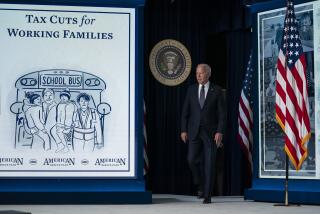Panel Would Cut Parents’ Tax Break on Gifts to Children
- Share via
WASHINGTON — The Senate Finance Committee approved a proposal Tuesday that would restrict the ability of affluent parents to avoid taxes through gifts to their children, agreeing to limit any tax-free unearned income of a child under 14 to $2,000.
The provision, which would tax a child’s unearned income above $2,000 a year at the parents’ top rate, would affect an estimated 1.5 million families and bring in about $1.2 billion over the next five years.
‘Worst Spoiled Brats’
In arguing for limiting gifts to children in wealthy families, Sen. Russell B. Long of Louisiana, the committee’s ranking Democrat, complained: “These teen-agers are often the worst spoiled brats on God’s green earth.”
However, children 14 or older would not have to pay higher taxes under the proposal, and income from grandparents’ gifts would not be taxed at the higher rate.
President Reagan had recommended the ceiling approved Tuesday as part of his tax overhaul plan, and it was adopted by the House last December. Finance Committee Chairman Bob Packwood (R-Ore.), who originally had sponsored a more generous provision, endorsed the limit and the panel accepted it on a voice vote.
Meanwhile, the committee cleared a key stumbling block to tax revision after senior members of the panel forged a compromise on the controversial issue of tax-free bonds. Packwood and Sen. Dave Durenberger (R-Minn.) presented a compromise package that would cost the government an estimated $4.4 billion over five years, compared to current law--$1 billion more than Packwood’s original proposal.
By contrast, the House bill would have raised an estimated $3.1 billion over a five-year period, setting the stage for a future conflict over tax-free industrial development bonds if the tax bill ever reaches the point where House and Senate negotiators meet to resolve differences between their separate versions of the bill.
The key differences between the Finance Committee plan and the House bill affect tax-free bonds used to finance home mortgages and rental housing.
Under the Senate proposal, state and local governments could continue to issue tax-free mortgage bonds, but the House would let that authority expire after 1987. Unlike the House measure, the Senate proposal would not limit tax-free financing for rental housing that is partly used for low-income families.
The Senate proposal, which is expected to be formally approved Thursday, would also allow tax-free financing for hazardous waste dumps--a provision not included in the House bill.
At the same time, the Senate plan would be more generous than that of the House in allowing private firms to benefit from tax-free bonds.
Panel Breaks Even
In contrast to the previous day, when the committee voted tax breaks worth about $3 billion over five years, Tuesday’s tenative decisions at least broke even. The limit on children’s income would mean about $700 million more in revenue than Packwood’s original package, but a decision to adjust estate tax brackets to account for inflation would cost the Treasury about $700 million.
Packwood again conceded that the panel would need to revise some of its decisions once it nears the end of its efforts on tax revision, but he dismissed worries that the committee’s generosity so far means that he will not be able to put together an acceptable tax overhaul package.
More to Read
Get the L.A. Times Politics newsletter
Deeply reported insights into legislation, politics and policy from Sacramento, Washington and beyond. In your inbox twice per week.
You may occasionally receive promotional content from the Los Angeles Times.










